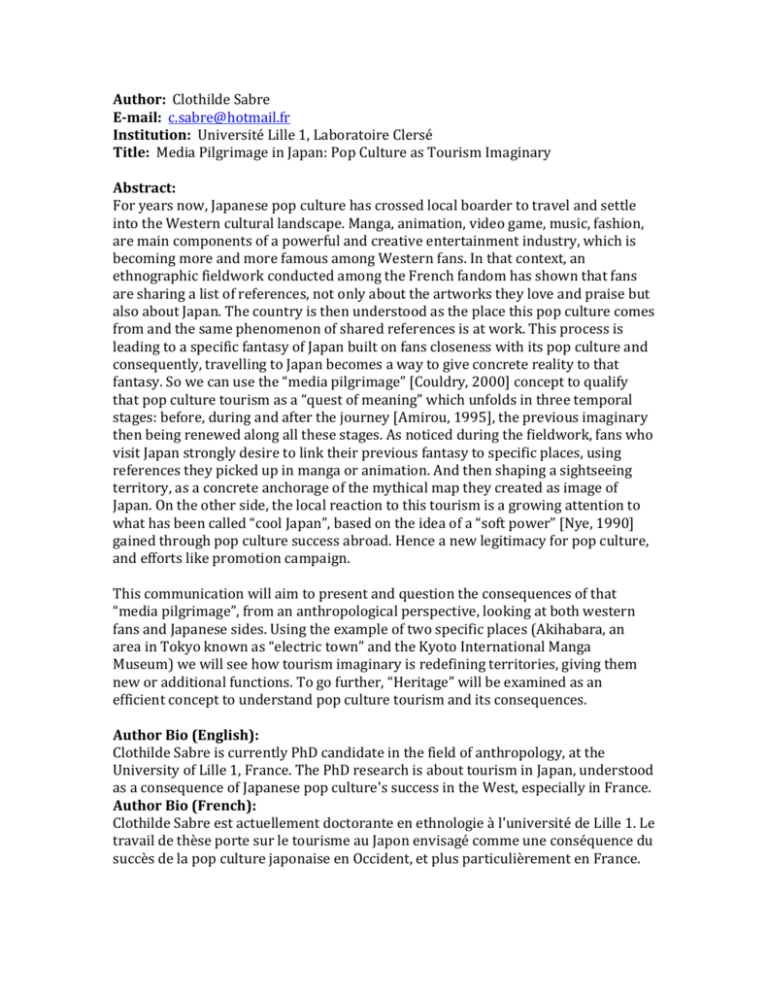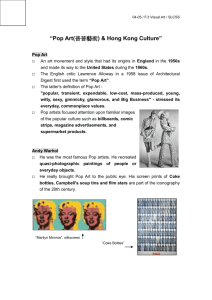Media Pilgrimage in Japan
advertisement

Author: Clothilde Sabre E-mail: c.sabre@hotmail.fr Institution: Université Lille 1, Laboratoire Clersé Title: Media Pilgrimage in Japan: Pop Culture as Tourism Imaginary Abstract: For years now, Japanese pop culture has crossed local boarder to travel and settle into the Western cultural landscape. Manga, animation, video game, music, fashion, are main components of a powerful and creative entertainment industry, which is becoming more and more famous among Western fans. In that context, an ethnographic fieldwork conducted among the French fandom has shown that fans are sharing a list of references, not only about the artworks they love and praise but also about Japan. The country is then understood as the place this pop culture comes from and the same phenomenon of shared references is at work. This process is leading to a specific fantasy of Japan built on fans closeness with its pop culture and consequently, travelling to Japan becomes a way to give concrete reality to that fantasy. So we can use the “media pilgrimage” [Couldry, 2000] concept to qualify that pop culture tourism as a “quest of meaning” which unfolds in three temporal stages: before, during and after the journey [Amirou, 1995], the previous imaginary then being renewed along all these stages. As noticed during the fieldwork, fans who visit Japan strongly desire to link their previous fantasy to specific places, using references they picked up in manga or animation. And then shaping a sightseeing territory, as a concrete anchorage of the mythical map they created as image of Japan. On the other side, the local reaction to this tourism is a growing attention to what has been called “cool Japan”, based on the idea of a “soft power” [Nye, 1990] gained through pop culture success abroad. Hence a new legitimacy for pop culture, and efforts like promotion campaign. This communication will aim to present and question the consequences of that “media pilgrimage”, from an anthropological perspective, looking at both western fans and Japanese sides. Using the example of two specific places (Akihabara, an area in Tokyo known as “electric town” and the Kyoto International Manga Museum) we will see how tourism imaginary is redefining territories, giving them new or additional functions. To go further, “Heritage” will be examined as an efficient concept to understand pop culture tourism and its consequences. Author Bio (English): Clothilde Sabre is currently PhD candidate in the field of anthropology, at the University of Lille 1, France. The PhD research is about tourism in Japan, understood as a consequence of Japanese pop culture's success in the West, especially in France. Author Bio (French): Clothilde Sabre est actuellement doctorante en ethnologie à l'université de Lille 1. Le travail de thèse porte sur le tourisme au Japon envisagé comme une conséquence du succès de la pop culture japonaise en Occident, et plus particulièrement en France.






